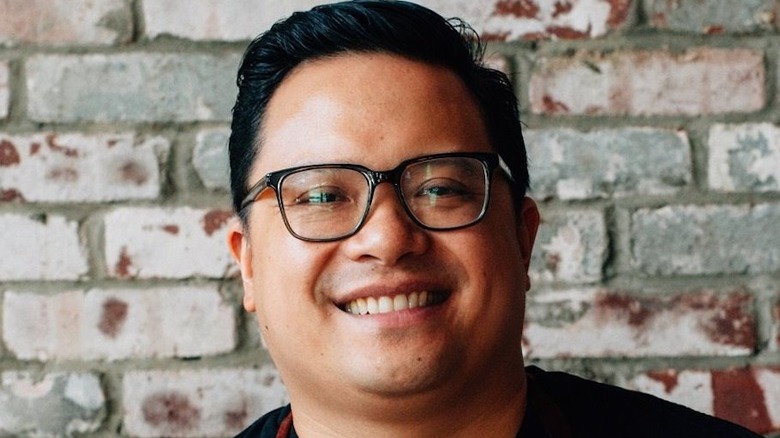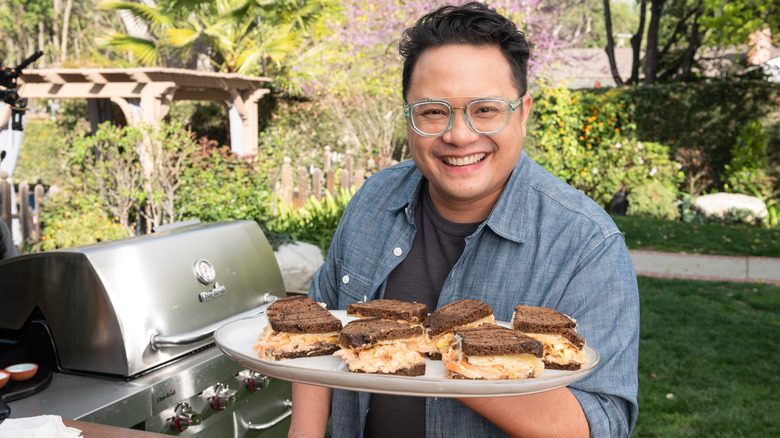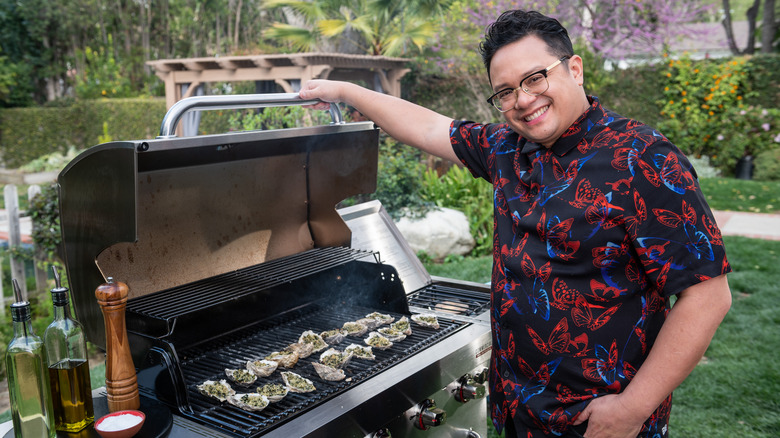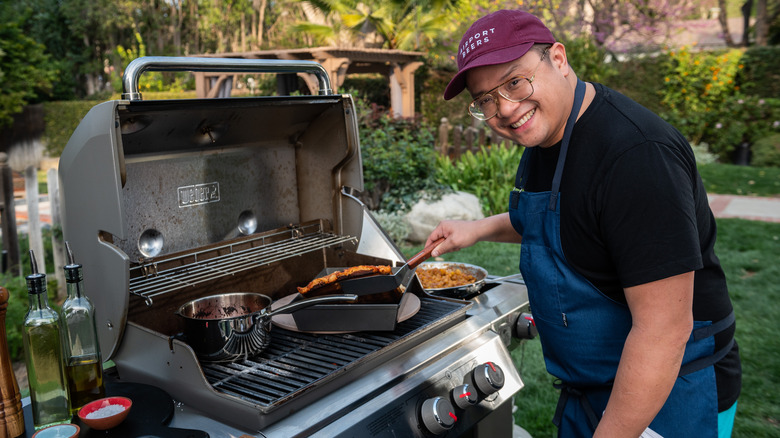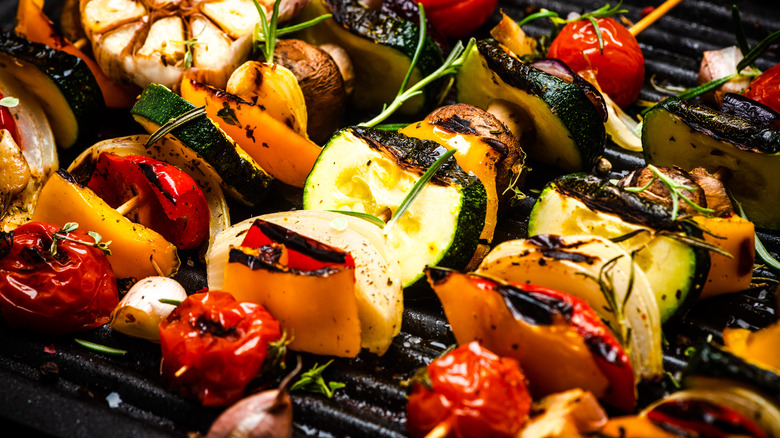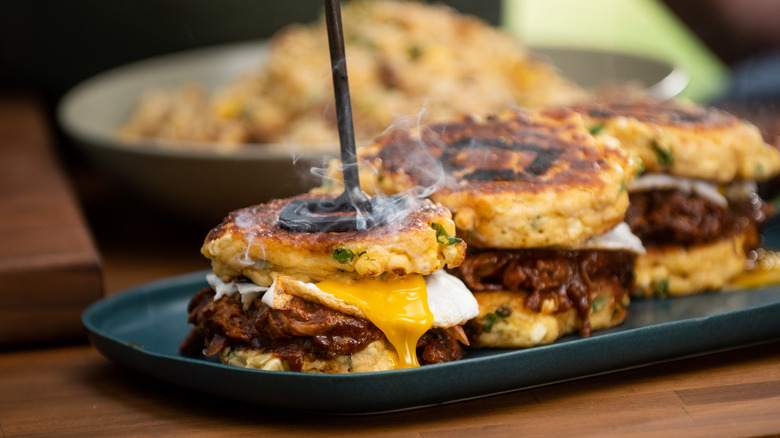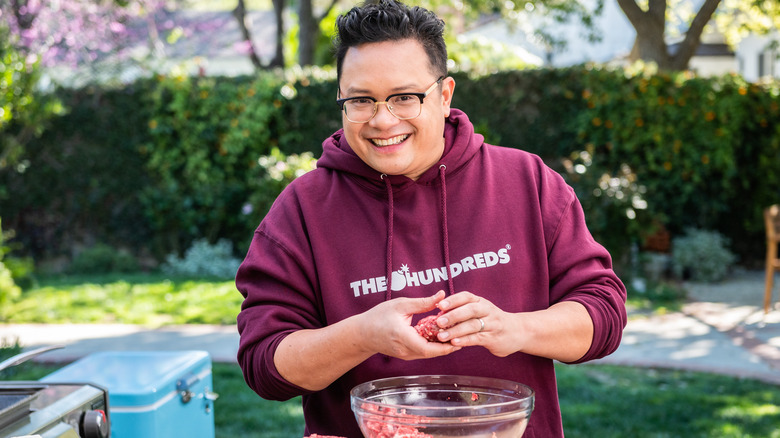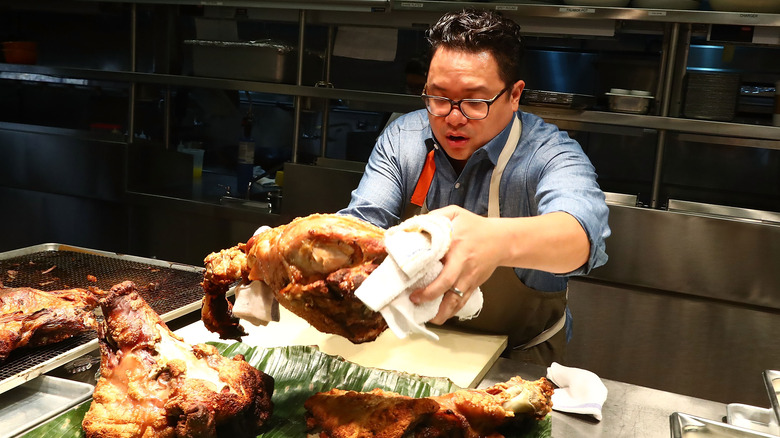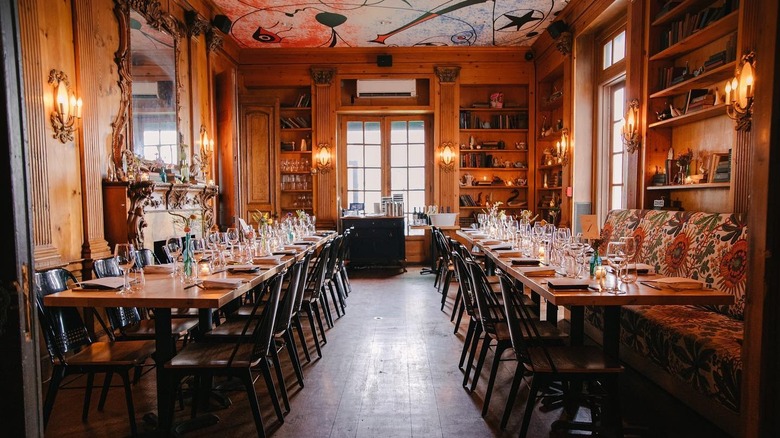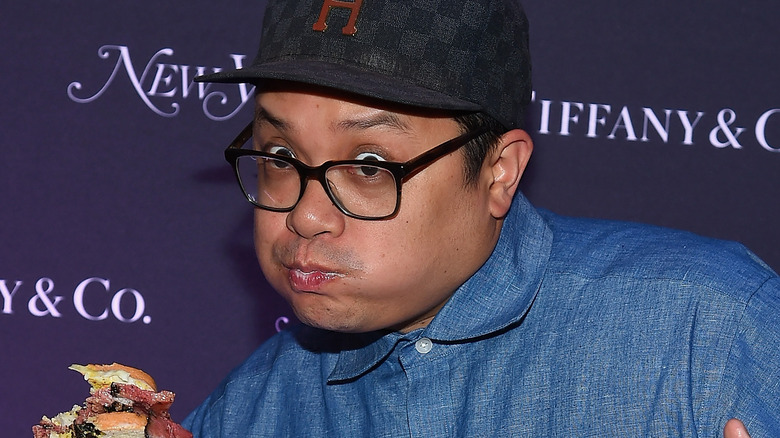Chef Dale Talde Dishes On "All Up In My Grill" Season 2, Goosefeather & More - Exclusive Interview
Summertime is nearing, and that means it's time to break out the grills — at least if you ask Dale Talde. The chef and TV host is back with the second round of his Tastemade series, "All Up In My Grill." And this time around, Talde says he's ready to raise the stakes — and the steaks — as high as those scorching summer temps.
For those who haven't watched, the show has a laidback, backyard barbecue vibe, with Talde sharing some of his best and boldest grilling recipes along with useful tips and tricks to turn you into a grill master in no time. The show isn't totally polished — there may or may not be an interruption by an ice cream truck at some point — but that's part of its appeal, along with Talde's silly and vivacious personality (something that made him a "Top Chef" favorite early on). With his new show, you'll learn some stuff, you'll probably laugh, and you'll definitely be hungry after watching.
Talde shared all the details and more in this exclusive interview with Mashed. The chef also opened up about how he wants to make you love grilling as much as he does, and what inspired his eclectic, newly award-nominated cooking style.
'Leveling up' for 'All Up in My Grill' Season 2
"All Up in My Grill" Season 2 is right around the corner. What can viewers expect from this season?
The level up! In Season 1, we were dipping our toes in the pool, and now we're leveling up, and we have a lot of fun, cool episodes. One of the things that we did was we looked at episodes from a technique standpoint and more of a how-to. One of our episodes is all about steak and cooking ... from big massive porter houses to a giant, dry-aged cote-de-boeuf to your everyday hanger steak that's been marinated and could be a great Tuesday night dinner.
This is also Tastemade's first time doing Grill Week. It's from June 27 to July 4, and we have a really cool crossover episode with Darrel Smith from "Mad Good Food" who comes on the show [with] some cool recipes that help me out on the grill. ... And if you've ever met Darrel, he's an amazing person, and he is a real specimen. The guy played in the NFL, and he is a great chef and amazing in front of the camera. But you look at the dude and go, 'So you played in the NFL?' ... He's such a nice guy and such a cool chef.
The reality of filming a food show in a backyard
What's the laidback backyard filming experience been like for you compared to spending time on sets like "Top Chef"?
To be honest with you, it's a lot, because [there are] a lot more things [to manage]. You don't have control over animals, landscapers, neighbors, honking horns, dogs, and ice cream trucks. It's challenging, [but] it's fun. You're also playing with things like when it gets dark, and the lighting when the sun sets, stuff like that. It has its own set of challenges while [being] amazing, because who doesn't love being outside, working in beautiful weather? It's fun and interesting and always new.
Speaking of challenges, were there any crazy or funny moments from filming Season 2 of "All Up In My Grill" that maybe don't make it on air?
There was one episode where we just couldn't get it right with the landscapers in the area. It was nonstop. These guys are just doing a job, man. They're on a schedule. This is when the person wants the lawn to get mowed. There was a little bribery going on: "Hey, can you pause this for half-an-hour? We'll get you some food." We were flat out like, "You guys, we're trying to do something. We'll be really quick, but can you come back to this at the end of your time with this person's lawn?"
Real-time life challenges.
It's real tough. These guys are just working, trying to do the job. We are actually imposing on their job. We looked at it like that. We're the guests in this neighborhood so ...
Well, I'm sure if you offered them what you're making on the grill, then everyone was happy.
They smelled it. They knew we were doing some fun stuff over there. They were like, "Yeah, no problem."
Talde wants people to love grilling as much as he does
What do you love about grilling so much, and what is it about this cooking method that gets you excited?
It [goes] to your roots. We've all done it, whether good, bad, or in the middle; everyone has done it to some degree of success. It's the original form [of cooking], with fire. There are no tweezers, no circulators, no sous vide machines, no liquid nitrogen, none of that stuff. It's fire and cooking, and there's something so back-to-basics about it.
And it's something that people find challenging. Any time you can put together food that teaches the viewer or inspires the viewer to do more, it's always what we're going for.
You've said it many times before, that part of your motivation for making this show is to get people to see their grill as an extension of their indoor kitchen. So what are some of your best tips for how we can get into that mindset at home and naturally turn to our grills?
One thing people are always intimidated about is, "How do I clean my grill?" Especially a gas grill. The easiest way to clean a gas grill [is to] just turn it on. Get that thing so hot that nothing will live on it. Once a grill is hot, it's easy to clean. I don't think people get that. They're like, "Oh, before I started grilling, I had to clean the grill." It's dead cold, and you haven't touched [it] all winter and it's now spring and you're trying to get it ... Get it fired up first! That's going to make it really easy to clean.
Then have a garbage [can], have a landing spot. If you're putting something on the grill, it's got to come off it at some point. Where are you putting it after that? Those are the things you have to think about. Where does it go after this?
Get a plate and have a garbage can ready ... an outdoor garbage can. You always use it when you're entertaining ... just have it out there and then change it. Let it be part of your routine. That's how to integrate your outside kitchen into your everyday [routine].
To grill like Dale Talde, start in your garden
For people who are new to grilling, what do you think is the easiest food to start with — beef, chicken, fish?
The easiest thing to start cooking ... start with vegetables. Stay away from proteins, even from the jump. Just [put the] vegetables you love on the grill. I think [about] the whole idea of sustainability and eating less animal protein. Summertime, spring and summer, that's when vegetables taste the best. You should start your meals with what vegetables you are eating and then supplement it with protein.
I have a garden at home. When my tomatoes and my eggplant and my chilies are all popping, that's what I'm cooking with, and that's what you should do. Cook the vegetables that are in season because it's going to be the easiest, and those are the things that are actually meant to be cooked over the grill.
When you're at home, how do you decide when to use the grill and when to just cook in the kitchen?
Once the temperature outside is above 70 [degrees], and once my windows are open, that's when I'm grilling. Because that means that I don't want to get the house too hot. I'm in Fort Lee, New Jersey, the Tri-State area. But, if you're in California, that's why you have those beautiful grills ... those outdoor kitchens and outdoor dining rooms, because you can do it almost all year-round.
I know you've tried it all, but is there anything that just does not work on the grill?
No, honestly. You can bake on a grill. I've seen people do it. I don't recommend it. We did pizzas this season, which I love. But making pastries and some of that stuff, that's meant to be in an oven. Even though you can use a grill like an oven. My thing is: Try it. If it doesn't work, you know it's not for you.
A grill is open for everything. You want to make dessert on the grill? It's the perfect place to start, but [don't] build the perfect dessert. Make a cobbler that doesn't have to be perfectly 375 degrees for an hour. It can fluctuate a little bit and still be good. Make "chefy" desserts, is what I say. Because chef's desserts tend to be less sciencey and techy. They have a little more leeway.
Finding inspiration for food through travel
Where are you finding your inspiration for this year's grilling season?
I'm always fascinated by travel, it's one of the things that we haven't done. I take inspiration from some of those places that I want to get back to like Spain ... [they] have a fantastic history of amazing grilled food. And Japan — my wife and I, [that] was our first trip together. I want to get back.
And also real cultural things. I'm Filipino, and I haven't been back in the Philippines in like five or six years, and I'm missing it. We have an awesome street food grilling culture. That's what I want, to [experience] all that. I want to travel, especially because I have a six-month-old. I'm not going anywhere any time soon. So I want to live vicariously through the food of places I want to visit. That's how people should find inspiration.
And don't stop at just the food. Let the beverages and everything else be part of this package. If you're going to go to Spain and you want to explore the Basque region or Catalan, go get yourself some chocolate and some Spanish wines. If you want to do Portugal, go get some vino verde and throw some sardines on the grill.
That's my thing ... I had a friend who wanted to get together on a Sunday, and he threw out a date and it just happened to be Greek Orthodox Easter. I jokingly was like, "Oh, I don't know if that weekend works for me. It's Greek Orthodox Easter." And they're like, "Oh, is that a big time at the restaurant?" I was joking, but said, "Let's do a Greek-themed dinner." We carried the theme out. He got a lamb shoulder and rubbed it down in a Greek-style. I brought pita, tzatziki, some dips, and made an orzo salad. He got a bunch of Greek wines. That's what I mean by, if you're going to go for it, do it.
How his cooking style became so eclectic, authentic, and personal
You are very much known for bringing together all these flavors and ingredients from across different cuisines, and ones that maybe we wouldn't normally think of. Can you explain a little what's behind this eclectic style for you and also what it says about your approach to authenticity?
I grew up in Chicago, in the northwest suburbs, where Korean, Polish, Pakistani, Filipino, Chinese, Bangladesh ... it was like the United Nations. The Filipino club in my school was a 100-something [people] deep. There was the African-American club. I graduated in '96, so think of how progressive this neighborhood was that we had ... all these clubs where people were just trying to embrace their heritage. That's maybe where some of my inspiration [comes from] ... And I like to travel. The food scene in Chicago and here in New York lends itself to being inquisitive about different cultures and foods because it's everywhere, and that's where my style came from.
Authenticity is a super real term, but I look at it from ... what does that mean to you as an individual, as opposed to, what does it mean about cuisine, or the origins of cuisine? I think about what is authentic to me versus even what's going to be authentic to my children, who are half-Korean and half-Filipino; that are going to be raised in the Northeast and living in New Jersey. What does that mean to them? And how do they create authenticity through their experience and where they've been?
That is far more important than when someone says, "Oh, this is my grandmother's recipe from Sardinia and this is how they make this dish." Or, "My parents are from Chiang Mai, and they only make this curry with these ingredients." It's like, well, we're not in Chiang Mai. We are very far from it. I'm inspired by that curry that I saw them make, but how do I make it with what I have available to me now? That's a very real thing.
I know there's people that are like, "Oh, if I don't have these ingredients, I can't make that dish because I'm trying to stay [true] to the authenticity of the dish." Well, why would you stop me from making something if I feel like eating it? You can't replace that item, but you can find substitutions. Necessity is the mother of all invention.
Chef Talde's top takeaways from 'Top Chef'
We'd be remiss to not ask a little bit about "Top Chef." Looking back on those days, and also some of the other shows that you've appeared on like "Chopped," "Beat Bobby Flay," "Iron Chef America," what are the most important things that you've learned on these intense competitions that you use the most in your career today?
"Top Chef" is one of those shows that's not just a show to create drama or the sensationalism of cooking on a show. The yelling, the winning and losing, the screaming at somebody ... Now there's less drama because the show is [trying] to separate themselves from the others that are just drama-based for no reason. Like, "Let me make these guys cook together who've never cooked together; let me make someone an executive chef or the leader of this crew when no one really has to be accountable for anybody else; and let me seat 150 people at one time, and see how it goes." There's no restaurant that will seat 150 people at one time and be successful. That's why we have reservation systems and hostesses and managers that say, "It's going to be a little bit" so we can seat you and control that.
What that show specifically has taught me is that anything is possible. Some people will look at challenges and say, "Oh my God, it's impossible." What "Top Chef" shows you ... is that you're a good enough chef to get yourself out of it. If you have to cook for 300 people, a wedding for 300 people, and you have 24 hours. [You're] going to do the best job you can. And of course, it's not going to be perfect, but it shows that, [given] more time, I can do this.
Also being able to cook on the fly. It's not always the best chef on those shows that wins. There are people that are like, "I have Michelin stars, I worked with these guys." And sometimes their brain doesn't work in that way ... to be on the fly or super improvisational. They need three-and-a-half weeks to put a dish on a menu. And a lot of those shows aren't built for that kind of person.
Talde dishes on his restaurant Goosefeather and his James Beard nomination
We also wanted to say congratulations on your James Beard nomination.
Thank you so much. That means a lot. First of all, the credit's due to the team because those are the guys who are in the trenches every day. Goosefeather, even during the pandemic, has been the most rewarding project of my entire life. Leaving a restaurant group, closing all the restaurants, and then jumping into something new — a new area, a new part of town — and everyone picking up what we're putting down, it's been so gratifying. You feel like you know you did the right thing when all this stuff starts to happen. It's not what we shoot for — obviously, we want to run a good business; we want to create great culture; we want to be an asset to the neighborhood — but when you do get recognized for these things, it makes you feel better. It makes you feel good about what you're doing.
How did you end up in Tarrytown, NY for Goosefeather?
The restaurant found me. The ownership group of the restaurant, we had a mutual friend. I looked at the property — it was right when I dissolved all the restaurants and was starting a new group with my wife — and said, "Hey, this is a possibility."
Then we did the walkthrough and they showed me the backyard. There's such a sprawling space. I looked at it and said, "This outdoor is going to be really something in the summer." And we've been able to turn it into something magical. I do love the restaurant when it's quaint and inside, but when it goes outside, it's really magical. There are four garden beds, we've done beautiful landscaping, and you feel like you're transported somewhere else when you dine in the backyard.
What's next for Talde and his favorite fast food
Do you think you'll open up more New York City restaurants in the future?
I'm working on a project in LaGuardia [Airport] right now, a noodle bar. We'll see. There's a certain type of project that I like getting into. I love partnering up with hotels — it gives me a lot of flexibility. There's a lot of symbiotic relationships that benefit both parties, and I'm looking for those types of projects. But I'll always love New York City, you never know, but right now we're focusing on Westchester and LaGuardia and we'll see what comes next.
Who's the one chef that you'd love to cook you dinner?
I would say Charlie Trotter. God rest his soul.
What is one ingredient that you can't live without?
Fish sauce.
And what is your go-to fast food order?
Popeye's four piece. A thigh, leg, and breast wing. A biscuit, mac and cheese, and coleslaw. And a 50-50 lemonade tea.
"All Up In My Grill" Season 2 premieres May 25 on Tastemade. New episodes will air on Tastemade's streaming network — available across platforms like YouTube TV, Samsung TV Plus, VIZIO SmartCast TVs, The Roku Channel, Comcast Xfinity X1, and more — and on the Tastemade+ app.
This interview has been edited for clarity.
